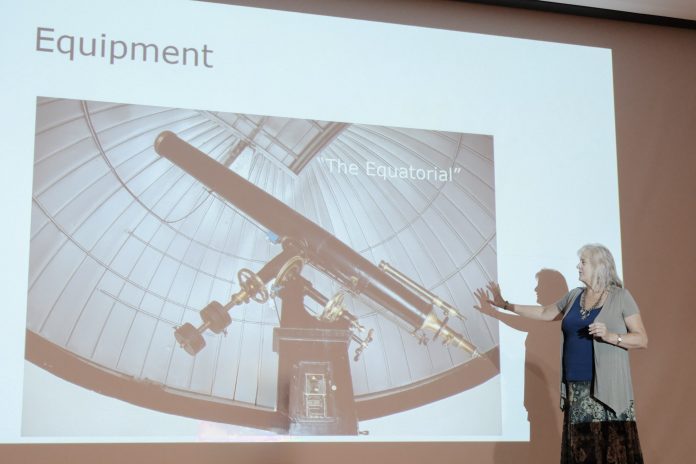
Last Tuesday, Sept. 16, the McKim Observatory held the First Light Festival from 7 to 8 pm, celebrating both the future of astronomical discovery and its own rich 140-year history.
The event recreated the magic of a telescope’s “first light”—the moment a newly constructed instrument is first pointed at the heavens. While the observatory’s original first light occurred on August 26, 1885, Tuesday’s gathering served as a reminder of the continuous cycle of wonder and inquiry that has defined McKim for over a century.
The evening was a blend of past and present. Guests explored the observatory’s treasured artifacts, including the library, the clock room, the chronograph, and the transit telescope, all under the guidance of knowledgeable faculty and staff. Upstairs, the iconic Clark telescope was trained on the moon, offering visitors a breathtaking close-up of the celestial body that has captivated humans for millennia.
The event saw a heartwarming mix of DePauw students, faculty, staff and local community members, continuing McKim’s long-standing tradition of sharing the cosmos with Putnam County and beyond. The night even made history of its own, according to Dr. Diana Forbes, a new physics professor who volunteered at the event.
“I volunteered to have people sign the guest book and to tell people about artifacts in the observatory,” said Dr. Forbes. “It was a fun night with a decent turnout... A golden retriever named Elsa attended the event, so I made history by signing her name into the guest book. I believe she’s the first documented dog visitor to the McKim observatory!”
Beyond the novelty of a canine guest, the festival underscored the significance of an observatory to a liberal arts education. For physics students, McKim is a living laboratory. It provides hands-on experience with astronomical techniques, transforming abstract equations and theories into tangible, observable phenomena. It is a place where students learn not just about the laws of the universe, but also about the patience and precision required to uncover them.
For the wider student body, McKim serves a deeper purpose. In an age of constant digital connection, the observatory offers a rare opportunity for quiet contemplation. Peering through a telescope is a humbling experience that puts earthly concerns into a cosmic perspective, fostering a sense of curiosity that is central to the liberal arts mission.
